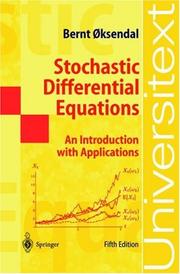| Listing 1 - 3 of 3 |
Sort by
|

ISBN: 0898714176 Year: 1998 Volume: 71 Publisher: Philadelphia (Pa.): SIAM
Abstract | Keywords | Export | Availability | Bookmark
 Loading...
Loading...Choose an application
- Reference Manager
- EndNote
- RefWorks (Direct export to RefWorks)
Population biology --- Biologie des populations --- Mathematical models. --- Modèles mathématiques --- 517.9 --- Differential equations. Integral equations. Other functional equations. Finite differences. Calculus of variations. Functional analysis --- 517.9 Differential equations. Integral equations. Other functional equations. Finite differences. Calculus of variations. Functional analysis --- Modèles mathématiques --- Mathematical models
Book
ISBN: 9033441500 Year: 1998 Publisher: Leuven Amersfoort Acco
Abstract | Keywords | Export | Availability | Bookmark
 Loading...
Loading...Choose an application
- Reference Manager
- EndNote
- RefWorks (Direct export to RefWorks)
I. FILTERING EN FREQUENTIEANALYSE 1. Signaaltransformaties en frequentiebeschrijving 2. Gebruik van signaaltransformaties 3. Bijzondere technieken en systeemtoepassingen II. STOCHASTISCHE SIGNAALANALYSE 4. Tijdsanalyse van stochastische processen 5. Stochastische filtering en frequentieanalyse 6. Stochastische modellen en toegepaste analyse III. DIGITAAL FILTERONTWERP 7. Analyse en realisatie van digitale filters 8. Ontwerpmethodologieën voor digitale filters 9. Bijzondere aspecten van digitale filtering
Electronique --- Elektronica --- 517.9 --- 621.395.38 --- 621.395 --- Academic collection --- #TELE:SISTA --- 681.3*G12 --- Signaalverwerking --- Filters --- Frequentieanalyse --- Signaalanalyse --- Differential equations. Integral equations. Other functional equations. Finite differences. Calculus of variations. Functional analysis --- Signalling and pulsing --- Telephony --- Approximation: chebyshev; elementary function; least squares; linear approximation; minimax approximation and algorithms; nonlinear and rational approximation; spline and piecewise polynomial approximation (Numerical analysis) --- Digitale filters --- Signaaltheorie --- Signaalverwerkingen --- Stochastische verschijnselen --- Digitale filters. --- Signaaltheorie. --- Signaalverwerking. --- Signaalverwerkingen. --- Stochastische verschijnselen. --- 681.3*G12 Approximation: chebyshev; elementary function; least squares; linear approximation; minimax approximation and algorithms; nonlinear and rational approximation; spline and piecewise polynomial approximation (Numerical analysis) --- 621.395 Telephony --- 621.395.38 Signalling and pulsing --- 517.9 Differential equations. Integral equations. Other functional equations. Finite differences. Calculus of variations. Functional analysis --- Signal processing --- Signal theory (Telecommunication). --- Digital electronics. --- Digital techniques.

ISBN: 3540637206 3662036207 9783540637202 Year: 1998 Publisher: Berlin Springer
Abstract | Keywords | Export | Availability | Bookmark
 Loading...
Loading...Choose an application
- Reference Manager
- EndNote
- RefWorks (Direct export to RefWorks)
The main new feature of the fifth edition is the addition of a new chapter, Chapter 12, on applications to mathematical finance. I found it natural to include this material as another major application of stochastic analysis, in view of the amazing development in this field during the last 10-20 years. Moreover, the close contact between the theoretical achievements and the applications in this area is striking. For example, today very few firms (if any) trade with options without consulting the Black & Scholes formula! The first 11 chapters of the book are not much changed from the previous edition, but I have continued my efforts to improve the presentation through out and correct errors and misprints. Some new exercises have been added. Moreover, to facilitate the use of the book each chapter has been divided into subsections. If one doesn't want (or doesn't have time) to cover all the chapters, then one can compose a course by choosing subsections from the chapters. The chart below indicates what material depends on which sections. Chapter 6 Chapter IO Chapter 12 For example, to cover the first two sections of the new chapter 12 it is recom mended that one (at least) covers Chapters 1-5, Chapter 7 and Section 8.6. VIII Chapter 10, and hence Section 9.1, are necessary additional background for Section 12.3, in particular for the subsection on American options.
Stochastic differential equations. --- 519.216 --- 517.9 --- Stochastic differential equations --- #ABIB:vcbt --- 519.2 --- Differential equations --- Fokker-Planck equation --- 517.9 Differential equations. Integral equations. Other functional equations. Finite differences. Calculus of variations. Functional analysis --- Differential equations. Integral equations. Other functional equations. Finite differences. Calculus of variations. Functional analysis --- 519.216 Stochastic processes in general. Prediction theory. Stopping times. Martingales --- Stochastic processes in general. Prediction theory. Stopping times. Martingales --- Equations différentielles stochastiques --- Probabilities. --- Partial differential equations. --- Mathematical physics. --- System theory. --- Calculus of variations. --- Probability Theory and Stochastic Processes. --- Partial Differential Equations. --- Theoretical, Mathematical and Computational Physics. --- Systems Theory, Control. --- Calculus of Variations and Optimal Control; Optimization. --- Isoperimetrical problems --- Variations, Calculus of --- Maxima and minima --- Systems, Theory of --- Systems science --- Science --- Physical mathematics --- Physics --- Partial differential equations --- Probability --- Statistical inference --- Combinations --- Mathematics --- Chance --- Least squares --- Mathematical statistics --- Risk --- Philosophy
| Listing 1 - 3 of 3 |
Sort by
|

 Search
Search Feedback
Feedback About
About Help
Help News
News